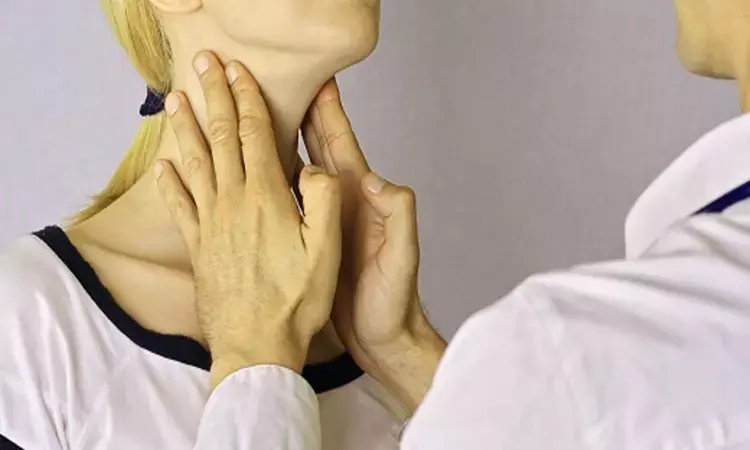- Home
- Medical news & Guidelines
- Anesthesiology
- Cardiology and CTVS
- Critical Care
- Dentistry
- Dermatology
- Diabetes and Endocrinology
- ENT
- Gastroenterology
- Medicine
- Nephrology
- Neurology
- Obstretics-Gynaecology
- Oncology
- Ophthalmology
- Orthopaedics
- Pediatrics-Neonatology
- Psychiatry
- Pulmonology
- Radiology
- Surgery
- Urology
- Laboratory Medicine
- Diet
- Nursing
- Paramedical
- Physiotherapy
- Health news
- Fact Check
- Bone Health Fact Check
- Brain Health Fact Check
- Cancer Related Fact Check
- Child Care Fact Check
- Dental and oral health fact check
- Diabetes and metabolic health fact check
- Diet and Nutrition Fact Check
- Eye and ENT Care Fact Check
- Fitness fact check
- Gut health fact check
- Heart health fact check
- Kidney health fact check
- Medical education fact check
- Men's health fact check
- Respiratory fact check
- Skin and hair care fact check
- Vaccine and Immunization fact check
- Women's health fact check
- AYUSH
- State News
- Andaman and Nicobar Islands
- Andhra Pradesh
- Arunachal Pradesh
- Assam
- Bihar
- Chandigarh
- Chattisgarh
- Dadra and Nagar Haveli
- Daman and Diu
- Delhi
- Goa
- Gujarat
- Haryana
- Himachal Pradesh
- Jammu & Kashmir
- Jharkhand
- Karnataka
- Kerala
- Ladakh
- Lakshadweep
- Madhya Pradesh
- Maharashtra
- Manipur
- Meghalaya
- Mizoram
- Nagaland
- Odisha
- Puducherry
- Punjab
- Rajasthan
- Sikkim
- Tamil Nadu
- Telangana
- Tripura
- Uttar Pradesh
- Uttrakhand
- West Bengal
- Medical Education
- Industry
HDL function gets impaired in severe hypothyroidism patients: JCEM Study

Netherlands: CEC, an important antiatherogenic metric of HDL function is impaired during severe short-term hypothyroidism, according to a recent study in the Journal of Clinical Endocrinology & Metabolism.
Severe hypothyroidism impacts lipoprotein metabolism including an increase in high-density lipoprotein (HDL) cholesterol. However, its (severe hypothyroidism) effects on HDL function are ambiguous. To fill this knowledge gap, Thera P Links, University of Groningen, University Medical Center Groningen, RB Groningen, The Netherlands, and colleagues conducted the observational study to determine the impact of severe short-term hypothyroidism on HDL particle characteristics, HDL cholesterol efflux capacity (CEC), and HDL antioxidative capacity.
The study enrolled 17 thyroid cancer patients (median age, 46 years; 16 women) who had undergone total thyroidectomy. In this cohort, the median thyroid-stimulating hormone (TSH) level was 81.9 mU/L and free thyroxin was 2.3 pmol/L.
Outcome measures included HDL particle characteristics (nuclear magnetic resonance spectrometry), CEC (human THP-1-derived macrophage foam cells and apolipoprotein B-depleted plasma), and HDL anti-oxidative capacity (inhibition of low-density lipoprotein oxidation).
Key findings of the study include:
- During hypothyroidism plasma total cholesterol, HDL cholesterol and apolipoprotein A-I were increased.
- HDL particle concentration was unchanged, but there was a shift in HDL subclasses toward larger HDL particles.
- CEC was decreased, also when corrected for HDL cholesterol or HDL particle concentration.
- HDL antioxidative capacity did not change.
"During severe short-term hypothyroidism CEC, an important antiatherogenic metric of HDL function, is impaired. HDL cholesterol and larger HDL particles are increased but HDL particle concentration is unchanged," wrote the authors.
Combined, these findings suggest that HDL quality and quantity are not improved, reflecting dysfunctional HDL in hypothyroidism.
The study, "HDL Cholesterol Efflux Capacity is Impaired in Severe Short-Term Hypothyroidism Despite Increased HDL Cholesterol," is published in the Journal of Clinical Endocrinology & Metabolism.
DOI: https://academic.oup.com/jcem/article-abstract/105/9/e3355/5881625
Dr Kamal Kant Kohli-MBBS, DTCD- a chest specialist with more than 30 years of practice and a flair for writing clinical articles, Dr Kamal Kant Kohli joined Medical Dialogues as a Chief Editor of Medical News. Besides writing articles, as an editor, he proofreads and verifies all the medical content published on Medical Dialogues including those coming from journals, studies,medical conferences,guidelines etc. Email: drkohli@medicaldialogues.in. Contact no. 011-43720751


